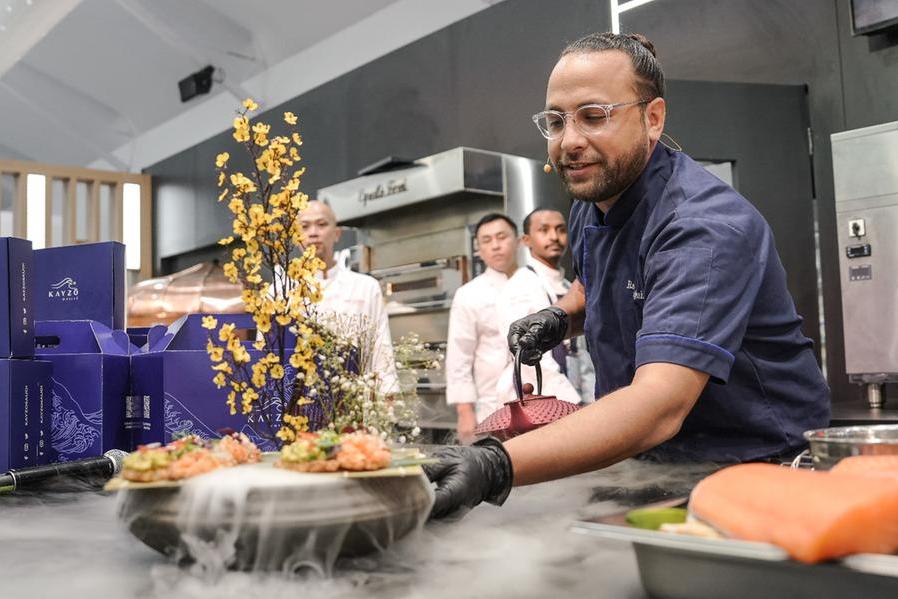Saudi Vision 2030 Spurs Business Alliances with Japan
In an epoch of transformation, Saudi Arabia's Vision 2030 fuels strategic tie-ups with Japan and global F&B innovators, propelling growth and diversity.
Published May 22, 2024 - 00:05am

Image recovered from zawya.com
TOKYO: At the Saudi Arabia-Japan Vision 2030 Business Forum in Tokyo, insightful discussions were held to enhance trade, investment, and cultural ties, showcasing a blossoming collaborative relationship. Saudi officials unveiled their aspirations to elevate this alliance, already evidenced by the growing presence of Japanese businesses in the Kingdom.
Saudi Arabia, in a bid to diversify beyond oil, eyes significant investments, bolstering its digital and entertainment sectors especially in gaming, where domestic advancements see localization of Japanese games and initiatives like the upcoming Esports World Cup.
RIYADH: Concurrently, the second Saudi Food Show illustrates the Kingdom's ambitions in the food and beverage sector, doubling its scope from its inaugural event. It serves as an international hub for F&B sourcing, with MODON emphasizing initiatives aligned with Saudi Vision 2030 to foster food security and boost industry through modern technologies.
The show, a platform for culinary excellence and innovation, features global and regional culinary figures and offers workshops for F&B entrepreneurs, demonstrating Saudi Arabia's proactive steps in establishing itself as the region's culinary nexus and a beacon for F&B business growth.
During the Saudi Arabia-Japan Vision 2030 Business Forum, Japanese businesses outlined the potential for multi-sectoral collaboration, spanning from infrastructure projects to high-technology exchanges. They underscored the strong strategic fit between Japan's technological prowess and Saudi Arabia's economic diversification goals. With renewable energy and sustainable practices forming the bedrock of this relationship, the two nations commit to reducing carbon footprints and tackling the pressing demands of climate change through shared initiatives.
Capitalizing on this synergy, the Kingdom of Saudi Arabia is set to introduce Japanese expertise into key economic zones. These zones aim to foster innovation, enhance competitiveness, and create jobs, ultimately attracting more foreign direct investment. This initiative isn't just about transposing Japanese practices onto Saudi soil but adapting and integrating them to meet the Kingdom's unique aspirations and cultural context.
The cultural exchange goes beyond conventional trade discussions, as both countries expressed interest in deeper, more profound connections through educational and people-to-people exchanges. Aspects of Japanese culture, such as language programs and artistic exchanges, are gaining traction within Saudi Arabia, while parallel efforts see Saudi cultural celebrations and exhibitions being increasingly hosted in cities across Japan.
Amid these cross-cultural dialogues, Saudi Arabia has emerged as one of the most important markets for Japanese automakers. The Kingdom's automotive market is witnessing a surge in demand for Japanese vehicles that are renowned for their quality and reliability. To meet this demand, the two nations are exploring joint ventures and technology transfers which will enable the production of Japanese vehicles on Saudi soil, reducing import costs and fostering local industry capabilities.
On the Saudi side, technology transfer is a key component of these partnerships. The Kingdom is pursuing a technology-driven economy as envisioned in the Saudi Vision 2030. As part of these endeavours, Saudi Arabia is adopting Japan's cutting-edge technologies in areas like robotics, artificial intelligence, and smart city infrastructure planning to revolutionize urban experiences and lifestyle in Saudi cities.
The Saudi-Japan relationship, deeply rooted in economic partnerships, is branching out into sports and cultural collaborations. Notably, the shared passion for sports, particularly football, is facilitating socio-cultural exchanges, with Saudi teams and Japanese trainers engaging in fruitful partnerships and exchange programs. This expands the ambit of bilateral ties from strictly business to also encompass sports diplomacy, offering a unique platform to foster mutual understanding and respect.
Furthermore, collaborations in healthcare are also on the rise, as Japanese pharmaceutical companies and medical technology providers are actively expanding their foothold in the Saudi market. This not only broadens the range of medical services and products available to Saudi citizens but also opens doors for collaborative research and development in cutting-edge medical technologies and drug discovery, in line with Saudi's vision for a vibrant life sciences ecosystem.
In the realm of academia, Saudi and Japanese universities are exploring collaborative research programs. These programs aim to harness collective intellectual resources to tackle global challenges while offering reciprocal opportunities for students and academics to study and conduct research abroad. The bilateral academic alliances are paving the way for groundbreaking research in science and engineering, creating an ardent community of international scholars.
The Saudi-Japan Vision 2030 Business Forum thus marks a pivotal moment not only in economic terms but as the dawning of a multifaceted partnership that shapes the future of both nations. It is an alliance that goes beyond commerce and industry, fostering a shared vision for prosperity, innovation, and cultural exchange in a rapidly changing world.







